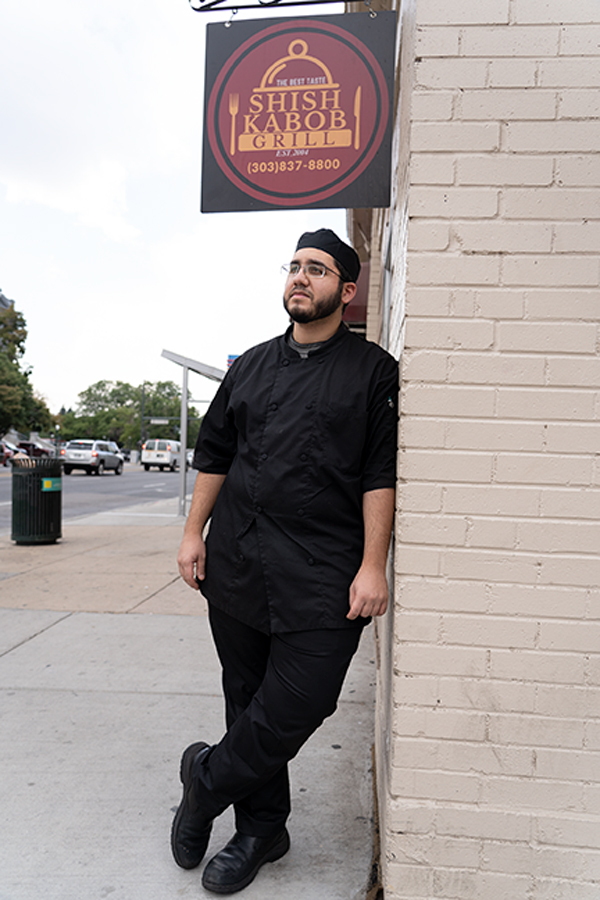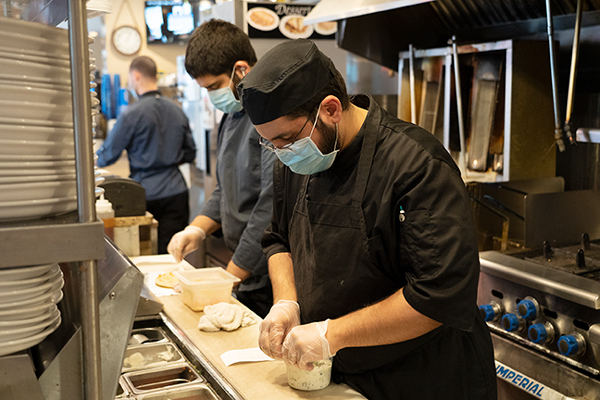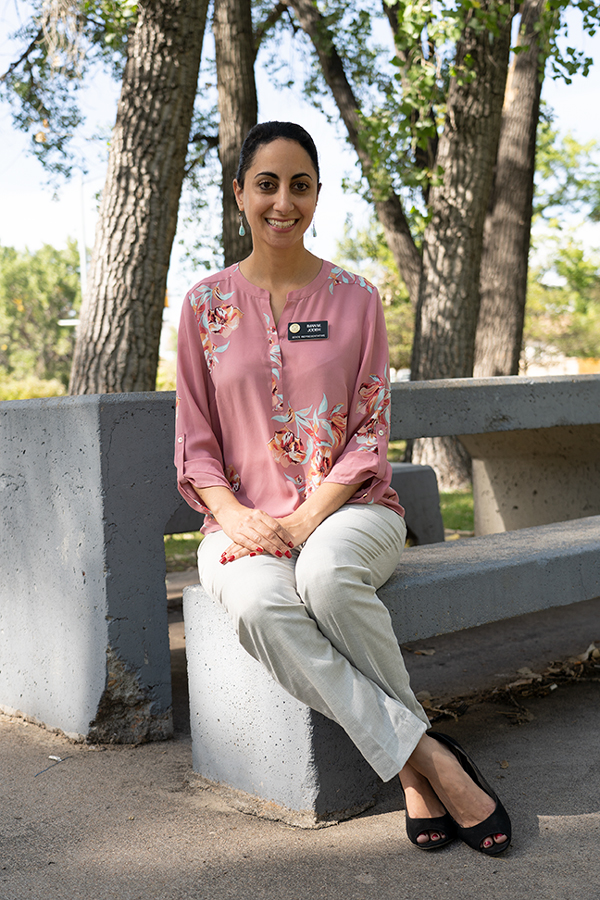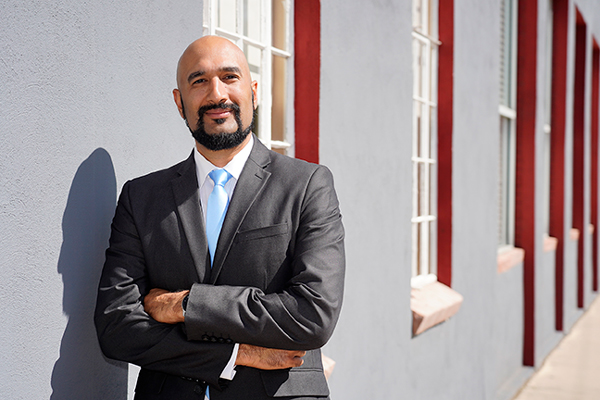KEEPING THE FAITH: For most Muslims in the region, the effects of Sept. 11 came the day after, and haven’t stopped
While most of Aurora and even the world recently hearkened back to the fateful day on Sept. 11, 2001 that changed the course of American history, it was Sept. 12 and beyond that has molded the lives of Muslims and others for the past two decades.
American Muslims have lived, and many grown up, under the shadow of the Sept. 11 terrorist attacks. Many have faced hostility and surveillance, mistrust and suspicion, questions about their Muslim faith and doubts over their Americanness.
They’ve also found ways forward, ways to fight back against bias, to organize, to craft nuanced personal narratives about their identities. In the process, they’ve built bridges, challenged stereotypes and carved out new spaces for themselves.
There is “this sense of being Muslim as a kind of important identity marker, regardless of your relationship with Islam as a faith,” says Eman Abdelhadi, a sociologist at The University of Chicago who studies Muslim communities. “That’s been one of the main effects in people’s lives … it has shaped the ways the community has developed.”
For decades, many residents in the Aurora region have been targeted for hate crimes or mistrust only because of the clothing they wear, because of their race or for adopting myriad cultures across the Middle East.
Their connection to Islam is frequently mistaken and judged by many as an all-or-none proposition.
While life in the metro area years after the terrorist attacks has been just American life for much of the time, for most Muslims, the branding and misbranding by others has ebbed and soared for 20 years, and it’s been relentless, Muslims in the region say.
A poll by The Associated Press-NORC Center for Public Affairs Research conducted ahead of the 9/11 anniversary found that 53% of Americans have unfavorable views toward Islam, compared with 42% who have favorable ones.
This stands in contrast to Americans’ opinions about Christianity and Judaism, for which most respondents expressed favorable views.
Mistrust and suspicion of Muslims didn’t start with 9/11, but the attacks dramatically intensified those animosities.
Accustomed to being ignored or targeted by low-level harassment, the country’s wide-ranging and diverse Muslim communities were foisted into the spotlight, says Youssef Chouhoud, a political scientist at Christopher Newport University in Virginia.
It’s not a small problem. History Colorado estimates that there are about 70,000 Muslim Coloradans in the state, with the bulk centered in Aurora and southeast Denver.
Some, like prominent Denver attorney Qusair Mohamedbhai suggests those are conservative estimates, and that the state’s Muslim population is now north of 100,000 people.
“Your sense of who you were was becoming more formed, not just Muslim but American Muslim,” he says. “What distinguished you as an American Muslim? Could you be fully both, or did you have to choose? There was a lot of grappling with what that meant.”
Twenty years beyond the day after Sept. 11, a handful of Aurorans directly affected by the nation’s unfair and unrelenting connection to extremist organizations halfway across the world talk about their lives now.
‘You people’ | Obeid Kaifo
Years after terrorists struck the World Trade Center and the Pentagon, a stranger’s middle name changed everything for Obeid Kaifo.

Portrait by PHILIP B. POSTON/Sentinel Colorado
In the thick of anti-Muslim sentiment across the nation, even in Aurora, the middle name of the senator from Illinois became a catalyst for hope for Obeid, and he thinks, a catalyst for change.
“Everything changed because the future president’s middle name was Hussein,” Obeid said this week while whipping up Mediterranean specialties at the family restaurants he runs on Denver’s Capitol Hill, Shish Kabob Grill.
Obeid has been in the thick of local politics for years, often chiming in on social media, primarily when it comes to foreign policy and events focusing on Syria, where his parents and other friends and family immigrated from or still live.
Born in California, Obeid grew up in Aurora, graduating from Overland High School. He went on to study at Metropolitan State University of Denver.
His life here, like many Muslims and other cultural minorities, has been an endless dance around being just another “American” and being distanced from that fact by others who consider themselves more American.
He realized even as a young boy, before the Sept. 11 attacks, that he was defined by his religion by just about everyone he knew who wasn’t also a Muslim.
He has long lamented that Catholics or Baptists can be Irish immigrants, Mexican pioneers or Vietnamese transplants. But a Muslim is a Muslim first in the eyes of most Americans, he said.
That wasn’t the same albatross after the Sept. 11 attacks as it was before.
“Before nine-eleven, nobody really knew anything about Muslims here,” he said. “Nobody really cared.”
Most Americans associated Muslims and Islam with Muhammed Ali and Malcolm X.
Syria? That was even more obscure to most of the kids in his Cherry Creek School District elementary school back in the late 1990s.
The terrorist attacks changed all of that.

Photo by PHILIP B. POSTON/Sentinel Colorado
Months after the attacks, he was accused of looking through bomb-making books in the library. He was in the fifth grade.
The next year, a student refused to team up with him on an in-school project because Obeid was Muslim.
“Why don’t you people just go home?” his sixth-grade classmate told him while they were working in the school library.
It always devolves to “you people,” Obeid said. Once curiosities before Sept. 11, Muslims became outsiders after.
“We still are,” he said.
That actually changed for a while, several years after Afghanistan was conscripted into the hunt for Osama bin Laden and a statue of Saddam Hussein was toppled, along with the Iraqi dictator it honored.
“Barrack Hussein Obama,” changed everything, Obeid said. “It was his middle name. He had the traditional middle name of millions of Muslims. It was huge.”
After years of being demonized as a Muslim, Obama flooded the nation with tolerance, hope, ethnicity and normalizing the once-exotic, primarily through his very name, Obeid said.
“He owned it,” Obeid said. “I was 18. He understood that his middle name meant something to millions like me.”
For eight years after, Obama and others that came to power near and far worked ceaselessly to bring reason, tolerance and understanding to the nation. While the “scarlet letter” of his religion and culture were never removed, they faded.
People in Aurora became accustomed to seeing men and women in traditional Middle Eastern clothing sacking groceries or washing their cars every day. As a community, most of Aurora came to understand that their Muslim neighbors were much more than just Muslims, and they were much more like everyone here than not.
It only lasted for eight years.
“Trump changed everything,” Obeid said. Even before he was elected, the anti-Muslim sentiment from the campaigns rolled downhill and into Obeid’s daily life.
He became “you people” again, he said.
“Why don’t you people quit blowing us up,” was the new refrain.
It got much worse.
Obeid said he sometimes wonders how much of Trump was genuine bigotry and how much was naked opportunism, pandering to a segment of America that thrives on whatever flavor of xenophobia is popular at the time. He points to Trump’s plan to build a tower in Dubai in 2005. Obeid saw the site while on a trip to Medina with his father in 2017.
Not only did it seem like Sept. 11 all over again when Trump was elected president, Obeid hasn’t seen much difference since he’s been gone.
“Everyone was so relieved after (President Joe Biden) took office, we didn’t seem to notice what he left behind,” Obeid said.
Enthused racists and bigots, feeling emboldened by Trump’s four years in office, continue to wield their anti-Muslim sentiment like an entitled club.
“It’s been terrifying,” Obeid said about what Trump created and what he’s left behind.
He said it’s too soon to tell what the Biden-Harris administration will bring, although he’s been disappointed in Vice-President Kamala Harris. Where Obama authentically wielded his position as a person of color and a minority, Obeid thinks Harris uses hers as a facade, clouding something else.
For the most part, he and most Muslims he knows have learned to shrug off public insults or worrisome stares. “We’re just trying to get through the pandemic like everyone else.”
And he’s thankful for the just-as-many people he knows who see him as another Aurora kid reaching into his 30s, making a name for himself as a successful Denver restaurateur.
But as exhausted as everyone is from the rise of extremism, the worry about COVID-19 and how it’s hammered his family business, the resurgence of having his identity bound to being a Muslim again seems too much at times.
In another 20 years?
We’re going to need a lot more Obamas, he said.
— Dave Perry, Staff Writer
‘It hasn’t been easy’ | Rep. Iman Jodeh
Like millions of Americans, Democratic state Rep. Iman Jodeh recalls being huddled around a television the morning of Sept. 11, 2001.
It was at the Tivoli student union on the University of Colorado’s Denver campus, where Jodeh, then 19, was a sophomore studying political science.
But the morning came with an extra dose of anxiety for Jodeh, a lifelong Auroran who last year became the state’s first Muslim state lawmaker.

Portrait by PHILIP B. POSTON/Sentinel Colorado
“I watched in horror as the events of that morning started to unfurl,” she said. “…And as a Muslim and as an Arab, I was holding my breath — I think like a lot of other people — praying that they didn’t share my identity. Once we found out, I think there was that sense of embarrassment and anger that rather than practicing what our religion teaches in terms of being a good neighbor and uplifting others and being a pillar in our society, they didn’t see it that way. And because of that, Muslims and Arabs have had to prove otherwise literally over the past 20 years. It hasn’t been easy.”
The college student quickly took to bridge-building by helping her father with his decade-long work of speaking with non-Arabs and non-Muslims across the metroplex about his religion and his origins. After the attacks on the East Coast, she said requests for her father to speak to all manner of community groups, from law enforcement agencies to rotary clubs proliferated, quickly becoming more than her father could handle on his own.
“When I started taking the overflow it kind of subconsciously kicked into gear everything I had seen him do over the last decade of my life,” she said. “And because I’m western-born and western-educated, people could see that I’m not the other. My family, my heritage, my religion are not the other. We look like other Americans just as much as they look like us.”
The work eventually spun into Jodeh forming her own non-profit group centered on the same mission dubbed Meet the Middle East. The organization now offers classes, consulting and immersion trips for young people.
The recent anniversary offered a time to reflect, Jodeh said, but the pain and loss of the past two decades are not tethered to a single day on the calendar.
“This isn’t just something on one day that we recognize or mourn,” she said. “This is something that for many people is every day, and we need to honor that.”
— Quincy Snowdon, Staff Writer
‘A complicated balance’ | Qusair Mohamedbhai
Indeed, for many Muslims across the Aurora region, Saturday offered a chance to mull the decades-long jockeying between the sense of national loss and the bolstering of Islamophobic sentiment 9/11 spurred.
“As a Muslim civil rights attorney, there’s a duality of the issue,” said Qusair Mohamedbhai, a Denver-based attorney who has represented several high-profile Aurora clients in recent years, including the family members of Richard “Gary” Black and Elijah McClain. “We’re Americans and the loss of life was just heartbreaking and devastating. But also, there’s the recognition of an entire religion being vilified for two decades …That’s a complicated balance that I think a lot of Muslims hold.”

Mohamedbhai, who was a law student in his early 20s when the attacks occurred in 2001, has served in recent years as counsel for the Colorado Muslim Society, helping to douse fires and ease tensions as instances of discrimination have arisen. He recalled instances of young girl’s having their hijabs removed from their heads, the surveilling of Muslim community centers and the time a pig’s head was placed on the grounds of the society’s mosque on South Parker Road.
Nationally, there were 28 reported incidents of crimes involving anti-Islamic motivation in 2000 with 36 victims, according to data on hate crimes compiled by the FBI. Those numbers surged to 481 separate incidents with 554 victims in 2001.
“Anti-Islamic religion incidents were previously the second least reported, but in 2001, they became the second highest reported among religious-bias incidents (anti-Jewish religion incidents were the highest), growing by more than 1,600% over the 2000 volume,” federal officials wrote in a 2001 memo on hate crimes.
Mohamedbhai said he’s seen a slightly downward trend in bias-motivated crimes against Muslims in the metroplex in recent years, and he’s been encouraged by a smattering of headlines. Some of those have included the swift adjudication of three teenagers accused of starting a house fire that killed five members of a Senegalese family in Green Valley Ranch, and the head of Anti-Defamation League apologizing that the group opposed the construction of a New York Islamic center in the wake of the Sept. 11 attacks.
Still, he said the undercurrent of Islamophobia is never fully dammed.
“I think we are getting to a place now where we’re trending in a better direction,” he said. “But you have folks like (U.S. Rep.) Lauren Boebert who call the Muslim congressional women the ‘jihad squad.’ It’s still seen as politically popular to be Islamophobic in certain Republican circles. I think President Donald Trump exposed that a lot of this is right there.”
Looking ahead, Mohamedbhai said the coming years will likely turn the national focus toward how the federal government chooses to treat Afghan refugees resettling in the United States after decades of war.
“They’re trying to figure out who’s coming into the country,” he said. “And that’s going to be the next chapter: How the government handles these immigration issues and to what extent of suspicion they’re going to be treating these Afghan refugees,” he said.
— Quincy Snowdon, staff writer
Read the article in its entirety at sentinelcolorado.com
